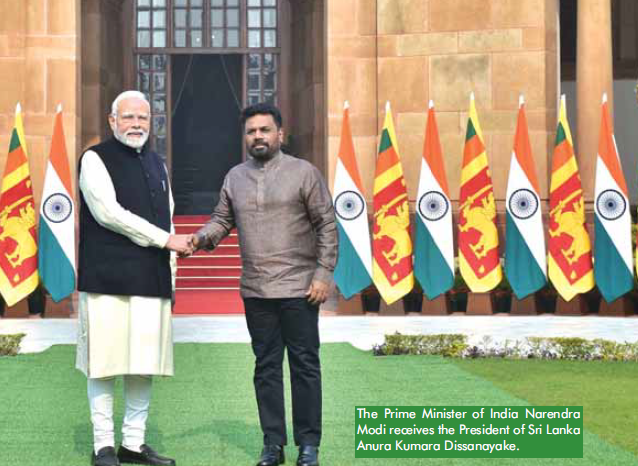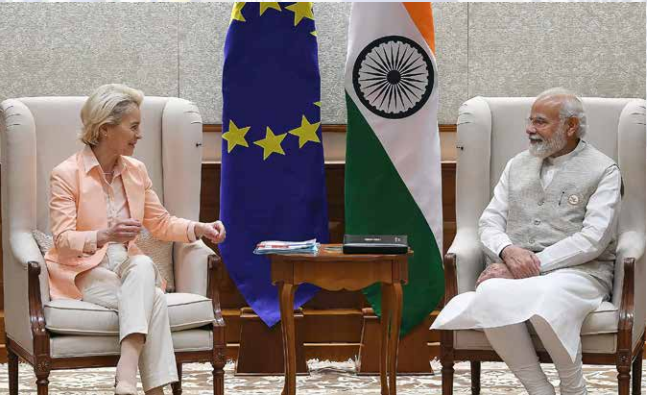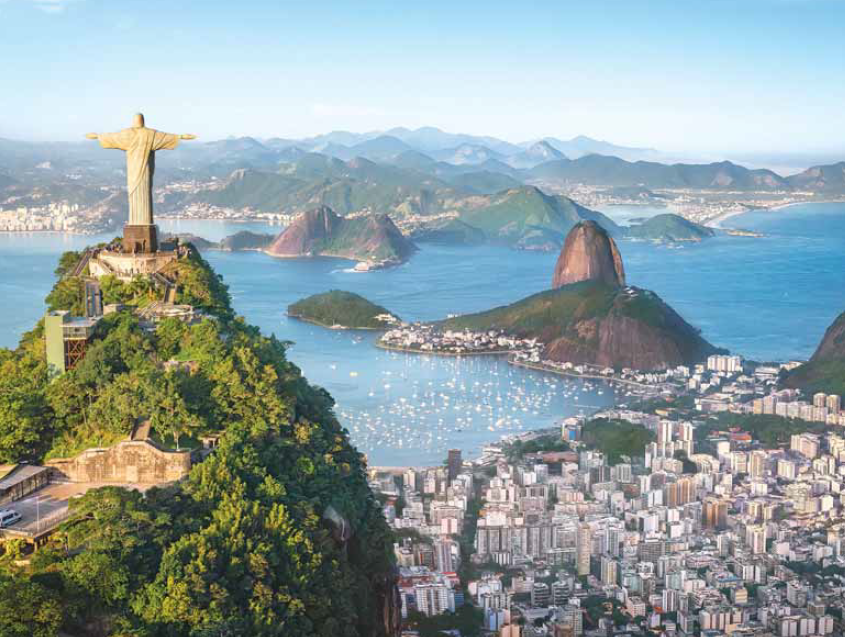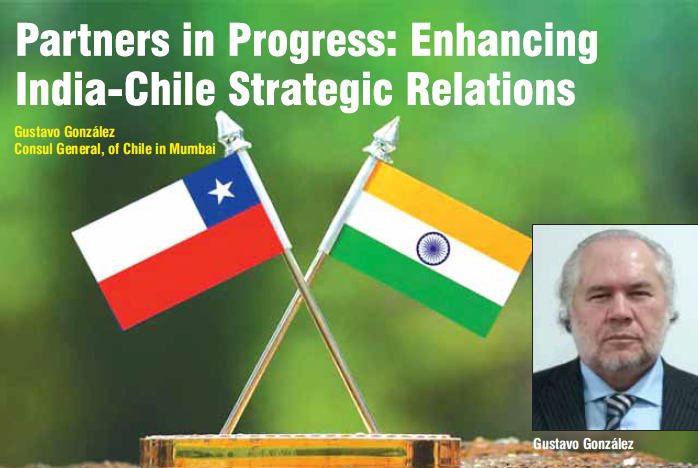There was much to cheer about India and Sri Lanka’s joint statement that promised a long and strong partnership for a shared future…
India and Sri Lanka have embarked on a promising journey toward an enduring partnership, as outlined in their joint statement, highlighting a shared future of mutual benefit and collaboration. The meeting between India’s Prime Minister, Narendra Modi, and Sri Lanka’s President, Anura Kumara Dissayanake, on December 16, 2024, during the latter’s State visit to the Republic of India, marked a significant milestone in the bilateral relationship between the two neighbouring countries.
Strong Bilateral Foundations
The India-Sri Lanka relationship is deeply rooted in cultural, civilisational, and geographical ties, coupled with robust people-to-people relations. The two leaders reaffirmed their commitment to nurturing this partnership through cooperation in various domains. President Dissayanake expressed profound gratitude for India’s steadfast support to Sri Lanka, particularly during the unprecedented 2022 economic crisis. India’s assistance, both during and after the crisis, played a pivotal role in alleviating the suffering of the Sri Lankan people.
Reaffirming the commitment to shared goals, President Dissayanake acknowledged the importance of India’s support in fulfilling Sri Lanka’s aspirations for a prosperous future and sustained economic growth. Prime Minister Modi, in turn, reassured President Dissayanake of India’s unwavering commitment to supporting Sri Lanka’s recovery and development, consistent with India’s ‘Neighbourhood First’ policy and the ‘SAGAR’ vision (Security and Growth for All in the Region).
Both leaders emphasised that bilateral ties had deepened significantly over time, significantly contributing to Sri Lanka’s socioeconomic progress. They agreed on the importance of further strengthening their cooperation to foster mutual prosperity, reinforcing the foundation of a comprehensive partnership that prioritises the welfare of the peoples of both nations.
Political Engagements and Development Cooperation
Over the last decade, political exchanges between India and Sri Lanka have increased, leading to enhanced bilateral ties. Prime Minister Modi and President Disayanaka decided to step up political engagements at the leadership and ministerial levels. They recognise that regular parliamentary exchanges can advance democratic values and institutional best practices.
In the realm of development cooperation, India’s ongoing assistance has had a transformative impact on Sri Lanka’s socio-economic development. Despite the ongoing debt restructuring efforts, President Dissayanake lauded India’s continued support for critical projects, particularly those aimed at reducing Sri Lanka’s debt burden. Notable initiatives include the Indian Housing Project, the Hybrid Renewable Energy Project for three islands, and the High Impact Community Development Projects being implemented across Sri Lanka.
The two leaders also outlined several new areas for cooperation, focusing on people-oriented development projects, such as the completion of the Indian Housing Project’s Phase III and IV, and the solar electrification of religious places in Sri Lanka.

Training and Capacity Building
India has also played a vital role in supporting Sri Lanka’s capacity-building efforts. The two leaders agreed to organise focused training for 1,500 Sri Lankan civil servants over five years through the National Centre for Good Governance in India. Additionally, both leaders emphasised the need for further training programmes tailored to Sri Lanka’s specific needs in civil administration, defence, and legal fields.
Debt Restructuring and Economic Stability
India’s strategic support has played a vital role in Sri Lanka’s economic revival. President Dissayanake expressed his gratitude for India’s multi-faceted assistance, which included emergency financing, foreign exchange support, and India’s pivotal role in Sri Lanka’s debt restructuring process. As Co-Chair of the Official Creditors’ Committee (OCC), India facilitated the prompt finalisation of debt discussions, which was crucial in stabilising Sri Lanka’s economy.
Based on these efforts, the two leaders agreed to transition from debt-driven models to investment-led partnerships across various sectors. This approach is expected to ensure a more sustainable and resilient path to economic recovery, growth, and prosperity for Sri Lanka.

Enhancing Connectivity and Energy Development
The leaders recognised the importance of enhancing connectivity between the two nations, emphasising the potential for mutual economic growth. While they expressed satisfaction with the resumption of passenger ferry services between Nagapattinam and Kankesanthurai, both leaders agreed to expedite the re-establishment of the passenger ferry service between Rameshwaram and Talaimannar. Additionally, they explored the possibility of jointly rehabilitating the Kankesanthurai port with grant assistance from India.
Energy security remains a key priority for both nations. The two leaders underscored the significance of strengthening energy cooperation to ensure timely and affordable energy resources for both countries. Key initiatives discussed include the solar power project in Sampur, LNG supply from India to Sri Lanka, and establishing a high-capacity power grid interconnection. The leaders also explored joint offshore wind power development in the Palk Straits while prioritising environmental protection.
Both countries reaffirmed their commitment to developing Trincomalee as a regional energy and industrial hub to help Sri Lanka’s energy security and economic growth.

People-Centric Digitisation and Technological Cooperation
India’s success in people-centric digitisation has been a model for governance and service delivery. Sri Lanka expressed interest in adopting similar systems with India’s assistance. Both leaders agreed to expedite the implementation of the Sri Lanka Unique Digital Identity (SLUDI) project and collaborate on the rollout of Digital Public Infrastructure (DPI) in Sri Lanka. They also discussed expanding digital financial transactions and leveraging India’s expertise in digital platforms such as UPI, Aadhaar, and GeM.
In education and technology, the leaders agreed to strengthen collaboration in research and development, particularly in agriculture, aquaculture, digital economy, and healthcare. They also explored expanding academic exchanges and fostering cooperation between start-ups in both countries.

Trade and Investment Cooperation
The India-Sri Lanka Free Trade Agreement (ISFTA) has significantly impacted bilateral trade. Both leaders acknowledged the vast potential for further expanding trade and investment. They agreed to continue discussions on the Economic & Technological Cooperation Agreement and explore the possibility of enhancing trade settlements between the two countries in local currencies.
Both leaders emphasised the importance of encouraging investments in key sectors to boost Sri Lanka’s export potential. They agreed to pursue discussions for the early finalisation of a bilateral Social Security Agreement, which would provide greater protection for the workers of both countries.

Agriculture, Animal Husbandry, and Strategic Cooperation
Agriculture remains a priority for both nations, with a focus on modernising Sri Lanka’s agricultural sector. The two leaders agreed to establish a Joint Working Group to explore comprehensive development in the sector. They also discussed ongoing cooperation in the dairy industry to promote self-sufficiency and nutritional security in Sri Lanka.
In terms of defence cooperation, both leaders recognised the shared security challenges in the Indian Ocean Region and the need for closer collaboration in countering traditional and non-traditional threats. India reaffirmed its commitment to assisting Sri Lanka in strengthening its defence and maritime security, providing vital support, including maritime surveillance equipment and disaster response capabilities.
Both countries also discussed enhancing cooperation on terrorism, narcotics smuggling, and intelligence sharing. They agreed to explore the possibility of a formal Defence Cooperation Framework, along with joint exercises, training programmes, and capacity-building initiatives.
Cultural and Tourism Development
The cultural ties between India and Sri Lanka are strong, and both leaders agreed on the need to promote cultural and tourism links further. They highlighted the importance of enhancing air connectivity and promoting investments in Sri Lanka’s tourism infrastructure. With India being Sri Lanks’s primary source of tourism, both leaders committed to establishing a framework for developing religious and cultural tourism, as well as fostering academic linkages to advance cultural and linguistic ties.

Fisheries Issues
Acknowledging the challenges fishermen from both countries face, and considering the livelihood concerns, the leaders agreed on the importance of addressing these issues in a humanitarian manner. In this regard, they emphasised the necessity of preventative measures to prevent aggressive behaviour or violence. They also welcomed the recent conclusion of the 6th Joint Working Group Meeting on Fisheries in Colombo. They expressed confidence that through dialogue and constructive engagement, a long-lasting and mutually acceptable solution could be reached. Given the special relationship between India and Sri Lanka, they instructed officials to continue their engagement to address these issues.
President Dissayanake expressed gratitude to India for its initiatives supporting the sustainable and commercial development of fisheries in Sri Lanka, including the development of the Point Pedro Fishing Harbour, the rehabilitation of the Karainagar Boatyard, and cooperation in aquaculture through Indian assistance.

Regional and Multilateral Cooperation
Recognising their shared maritime security interests in the Indian Ocean Region, both leaders agreed to strengthen regional maritime security, bilaterally and through existing regional frameworks. In this context, the leaders welcomed the recent signing of the Founding Documents of the Colombo Security Conclave, headquartered in Colombo. India reiterated its support for Sri Lanka in advancing the objectives of the Conclave.
India also expressed complete support for Sri Lanka’s chairmanship of the Indian Ocean Rim Association (IORA). Both leaders stressed the need for a substantive action plan by IORA member countries to ensure the security and development of the region.
Additionally, both leaders reaffirmed their commitment to further strengthening regional cooperation under the Bay of Bengal Initiative for Multi-Sectoral Technical and Economic Cooperation (BIMSTEC).

President Dissayanake requested the support of Prime Minister Modi for Sri Lanka’s application to become a member of BRICS. In turn, Prime Minister Modi expressed appreciation for Sri Lanka’s support for India’s candidature for a non-permanent seat on the UN Security Council for the term 2028-29. The leaders noted that the effective and timely implementation of the agreed measures, as outlined, would deepen the bilateral ties between their countries and set a new standard for friendly and neighbourly relations. Accordingly, they directed their officials to initiate the necessary measures for implementing these understandings and pledged to provide guidance wherever required. Both leaders further resolved to continue high-level engagement to enhance mutually beneficial bilateral relations, address Sri Lanka’s sustainable development needs, and contribute to the stability of the Indian Ocean Region. President Dissayanake invited Prime Minister Modi to visit Sri Lanka at his earliest convenience.






